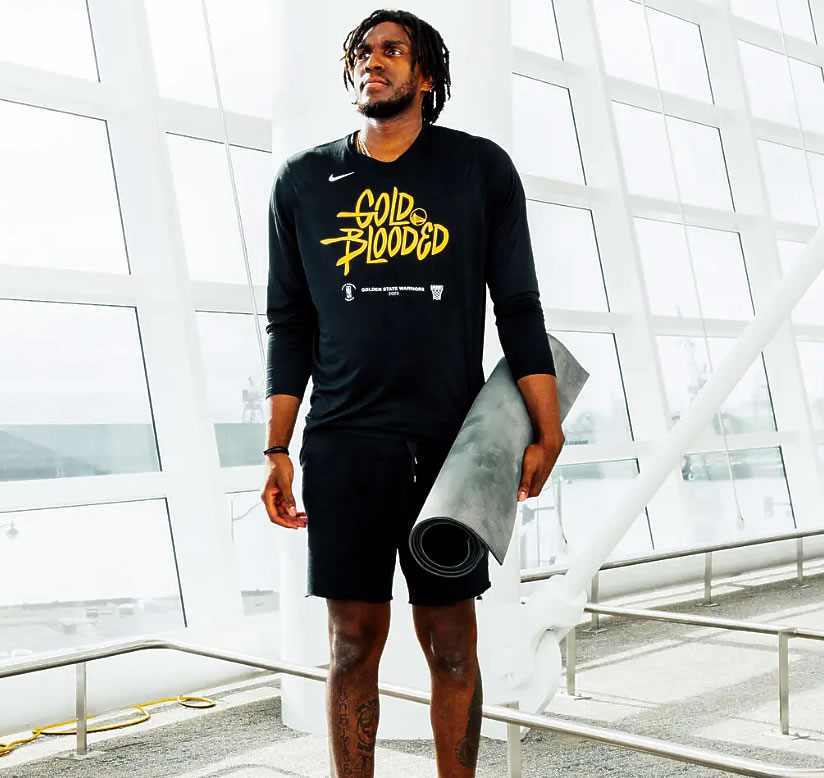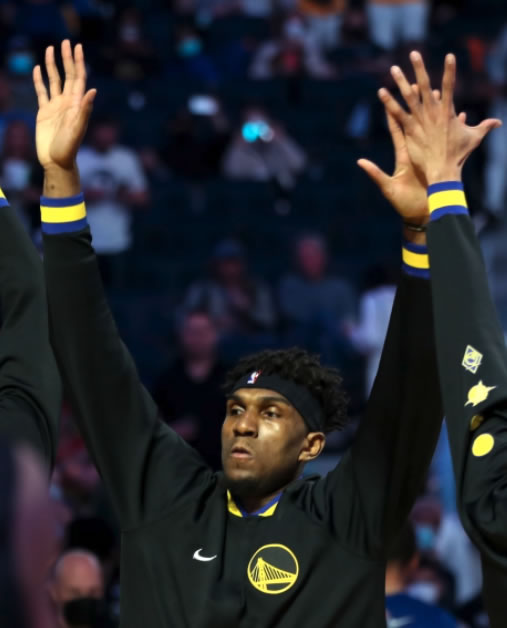Scott Cacciola for The New York Times on April 25, 2023
In recent years, Golden State’s Kevon Looney has turned to a form of yoga designed for athletes to help him avoid the injuries that had stymied his career.
SAN FRANCISCO — Early Sunday morning, Kevon Looney of the Golden State Warriors decamped to a quiet atrium on the fourth floor of Chase Center, where floor-to-ceiling windows offered an expansive view of San Francisco Bay. The sun was beginning to burn through a hazy sky as Looney propped his iPad against a small metal column, unrolled his black yoga mat and greeted one of the more important figures in his professional life.
A voice emanated from the iPad. It belonged to Jana Webb, the creator of a self-styled brand of yoga known as Joga, which she originally conceived as yoga for athletes. Webb, 47, appeared on a video conference call from her home in Toronto wearing a backward baseball cap. She is in Looney’s phone as “Jana Joga.”
“How’s the body feeling?” she asked.
“Really good,” Looney said.
Moses Moody, one of Looney’s teammates, was also on the call, dialing in from his apartment near the arena. It was 8:30 a.m., about four hours before Game 4 of Golden State’s first-round playoff series against the Sacramento Kings. Webb spent the next 40 minutes guiding both players through a series of movements designed to loosen their joints, activate their muscles and center their psyches.
“Reach, reach, reach,” she said as Looney, who is 6-foot-9, stood on his toes and extended his arms, a small pool of sweat forming on the mat below. “Get that fascial tension like you’re reaching for the net. Awesome. Now, hold.”
(Webb was referring to the fascia, which is connective tissue throughout the body — and not to the face, though Looney appeared to have some tension there, too.)

Earlier in his career, Looney could not seem to escape injury. But over the past two seasons, he has emerged as Golden State’s sturdiest player, appearing in every one of his team’s games. He practices Joga before every game, at home and on the road.
After Sunday’s session, Looney delivered against the Kings, finishing with 8 points, 14 rebounds and 6 assists to help the Warriors win their second straight game at home and even the series at two games apiece. In Game 3 on Thursday, he finished with 4 points, 20 rebounds and 9 assists while helping compensate for Draymond Green’s absence because of a suspension.
Game 5 is Wednesday in Sacramento.
“He’s always locked into the game plan,” Golden State Coach Steve Kerr said of Looney. “He never makes mistakes. He rebounds like crazy. He makes the right decision. The game is much simpler when Loon is out there for our guys.”
Looney, who has won three championships with the Warriors, said his work with Webb had helped him cope with the physical and mental rigors of the N.B.A. Those demands are only heightened in the postseason.
“It’s pretty brutal,” Looney said. “Every possession is intense. After the game, you’re just drained.”


At this late stage of the season, when players are tired and stressed, game-day routines take on added significance. Players are looking for whatever edge they can get, especially this year, when injuries to stars like Paul George, Kawhi Leonard and Giannis Antetokounmpo are a factor in so many series. Some players prioritize their naps. Others lace up their lucky sneakers. Looney does Joga.
“I love to have 30 minutes to be in my body and see how I really feel,” he said.
Looney got a head start in yoga as a high school senior in Milwaukee. Lou Chapman, who was one of his early basketball trainers, introduced him to Bikram Yoga — also known as hot yoga — when a new studio opened up. Looney recalled that he had barely survived his first class.
“I did a lot of laying on the mat,” he said. “I felt like I was a top athlete, but they destroyed me.”
The competitive side of Looney kept him coming back. Also, Chapman had gotten them discounted memberships, and he wanted to make sure that they took advantage of the deal.
“I think we went 90 straight days,” Chapman, 42, said.
During his lone season at U.C.L.A., Looney succumbed to a busy schedule and drifted away from yoga. After Golden State selected him as the 30th pick in the 2015 N.B.A. draft, he missed most of his rookie year with hip injuries — he had twin surgeries to repair right and left labrum tears — and later dealt with chronic nerve pain. He broke his collarbone during the 2019 N.B.A. finals and then had core muscle surgery in 2020. He returned for the 2020-21 season but felt disappointed by his play.

“I wasn’t moving as well as I had in the past,” he said. “I didn’t have that same burst or coordination.”
Following the season, Looney approached Dr. Rick Celebrini, Golden State’s director of sports medicine and performance, with a specific request: Did he know any yoga teachers?
In fact, Dr. Celebrini had someone in mind. He connected Looney with Webb, a fellow Canadian who had worked with other athletes for years. Their first virtual session was a doozy.
“I can’t say I loved it,” Looney said, “mostly because I stunk at it.”
Webb was unsparing in an initial assessment that she sent to Kyle Barbour, Golden State’s head performance coach, citing several areas where Looney’s mobility was limited. But she saw potential, and Looney experienced the sort of post-session soreness — in his glutes and his abdominal muscles, specifically — that signaled to him that he had room for improvement.
“We don’t do a lot of long static holds,” Webb said. “It’s really about duplicating the biomechanics of movement in sport.”
Looney worked with Webb several times a week that summer and then paused their sessions at the start of the 2021-22 season. At the time, Looney thought that Joga might just be a part of his off-season routine.

“But after six or seven games, I felt like my body was going back to how it was before,” he said. “My back was hurting, and different things weren’t moving as well. So I reached back out: ‘Can we do this on game days?’”
By the middle of last season, Looney had become such a believer that he organized a Joga session for anyone in basketball operations — players, coaches and staff members — who wanted to learn more. As usual, Webb led the class remotely. Even from thousands of miles away, she could sense varied levels of interest.
“Draymond clipped his toenails during it,” she said, laughing. “I was like, is this actually happening?”
Moody’s prevailing takeaway was confusion. As a teenager in Little Rock, Ark., he had dabbled in yoga by taking classes at his local LA Fitness. But Webb might as well have been speaking a foreign language.
“She was talking so fast about all these muscles we were supposed to be activating,” Moody said. “And I’m next to Loon, so I’m just trying to keep up with him, and I don’t know what I’m doing.”
But Moody was also intrigued. After spending the next couple of weeks peppering Looney with questions about Joga and human anatomy, Moody called Webb. “She gave me the rundown,” he said.

Looney invited Moody to join him at his next pregame Joga session and then paid for all of his classes for the remainder of the season. They have been inseparable Joga buddies ever since. If the team has a shootaround scheduled for 11 a.m., Looney and Moody will typically meet with their mats on the team’s practice court at 8:30 a.m. for 40 minutes of stretching, lunging, twisting and breathing.
“I can really tell the difference when I don’t do it,” Moody said. “You just feel more fluid in your movements. When that ball comes off the rim, you kind of feel like Spider-Man a little bit.”
After more than 200 remote sessions with Looney, Webb finally met both players for the first time when the Warriors were in Toronto in December to play the Raptors. “That was so special,” Webb said.
On Sunday, Webb started their session by having them do a series of breathing exercises.
“Relax your jaw for four,” she said. “Soften the ribs for three. Start to squeeze the lower belly for two. And now completely pull the breath and empty it there. Notice what you’re thinking about.”
Before long, Webb had them working through dynamic movements, one after another. She reminded Moody to keep his fingers spread when he was in a plank position. She urged Looney to lift his “pelvic floor.” She referred to their hip joints and femur bones, their side intercostals and adductors.
At the end of it, Looney lay flat on his back, closed his eyes and exhaled.




